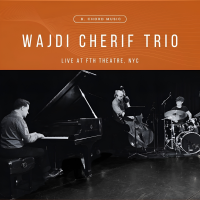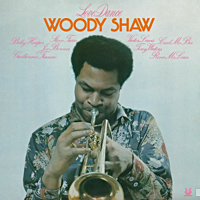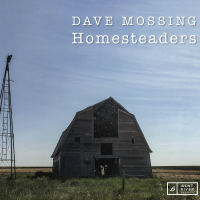Home » Jazz Articles » Album Review » Dwiki Dharmawan: Rumah Batu
Dwiki Dharmawan: Rumah Batu
Few labels, in fact, beyond the much larger ECM Records, have managed to bring so many diverse musicians from seemingly disparate backgrounds and cultures together to make music so glorious, so magical and so seemingly effortlessly groundbreaking. This, as it supports the adage of music being a universal language that brings people together, comes at a time when there are far too many factors conspiring to sow division.
The past couple of years have found Pavkovic increasingly parking himself and his growing cadre of musicians at La Casa Murada, the studio located in Catalunya, Spain that is the namesake for one of the label's first releases recorded at the studio, The Stone House (2017), a superb, incomparable outing featuring guitarist Mark Wingfield, touch guitarist Markus Reuter, bassist Yaron Stavi and drummer Asaf Sirkis, all of whom have been making increasingly regular appearances on MoonJune.
Stavi and Sirkis, who have become one of the label's rhythm sections of choice for their pliant ability to work their way into any musical context, appear on Dwiki Dharmawan's even more ambitious and expansive Rumah Batu, just as they did on the pianist's extraordinary Pasar Klewar (MoonJune, 2016). The Indonesian keyboardist's sophomore MoonJune release, following his more fusion-heavy 2015 label debut, So Far, So Close, was largely a trio affair, albeit with a bevy of guests including, in addition to a variety of Indonesian musicians, MoonJune staples like vocalist Boris Savoldelli and guitarists Wingfield and Nicolas Meier.
Rumah Batu, on the other hand, is centered around an unusually configured core quintet that includes, in addition to Dharmawan, Stavi and Sirkis, two musicians making their first appearances on the label: Parisian-based Vietnamese guitarist Nguyen Le, whose own discography, including 2005's Walking On the Tiger's Tail and 2008's Fragile Beauty, for Munich's Act Music label, demonstrates a similar pan-cultural mindset; and Spanish electric bassist Carles Benavent, perhaps best known for his periodic collaborations over the decades with keyboardist Chick Corea, including Rhumba Flamenco (Chick Corea Productions, 2005) and The Ultimate Adventure (Stretch, 2006).
Dharmawan recorded the music for Rumah Batu live off the floor at La Casa Murada with this core quintet, and it doesn't take long for the sparks to begin flying on the opening "Rintak Rebana," where guest Sa'at Syah's sulking (southeast Asian bamboo ring flute), overdubbed later at a Jakarta studio, renders Dharmawan's cross-cultural leanings crystal clear in the song's rubato introduction. But as soon as Sirkis' combination of conventional drums, cajón and hand percussion create a vibrant mood changer into the composition's central theme, it becomes clear that there are plenty of other touchstones at play, most notably that of Chick Corea, whose percussive approach to piano is but one of Dharmawan's many influential touchstones.
A knotty yet eminently singable theme, played in unison by Benavent, Lê and Syah, also speaks to Dharmawan's ability, like Corea, to shape long-form yet memorable melodies, as the piece moves into a solo section driven, first, by Lê's blend of volume pedal and delay-driven electric guitar. The guitarist sets an atmospheric tone that quickly changes as he moves into a searing passage filled with whammy bar-inflected, light-speed runs that set a tremendously high bar for an album that's only in its opening few minutes. Benavent follows, his electric bass also heavily processed with a harmonizer and more to create a solo just as electrifying, but in a significantly different way, all the while anchored by Stavi's upright bass and Sirkis' cymbal-heavy support. Dharmawan closes the solo section with a masterfully virtuosic display that quickly dissipates overt references to Corea, as the pianist builds to a fever pitch, pushed and pulled by Stavi and Sirkis, who both punctuate and embellish the pianist's combination of cross-register phrases and dynamic chordal injections. Dharmawan's use of various motifs to push the solo ever forward renders this truly one of the most exciting piano solos heard this (or, without exaggeration, any) year.
And that's just the first of Rumah Batu's eight tracks, where but one clocks in at six minutes, four come in at well over ten (with two linked together to create a 26-minute centerpiece) and the other three fitting somewhere in-between. The album is truly an improvisational tour de force, both in individual soloing and collective engagement, but Dharmawan often couches this freedom within compositional constructs that render Rumah Batu far more detailed and memorable than merely extemporaneous extrapolations. There are, indeed, passages of complete freedom; Rumah Batu's two-part title suite finds the group persistently dissolving and re-coalescing from the complete and utterly reckless abandon that seems to run as an underlying undercurrent, to varying degrees, throughout the entire album.
But it's clear that Dharmawan has planned this nearly 80-minute set with careful consideration and both forethought and afterthought. "Paris Barantai" begins with a playful minute-long solo piano intro that gradually opens into more expansive and expressive terrain. With Sirkis entering, first with delicate cymbal work but then, together with Stavi, building to an early peak bolstered by Benavent's lithe runs and Dharmawan's increasingly forceful chordal work, the piece finally reveals its theme: a doubling of Syah's wordless but phonetic vocals and soaring suling work that feels like a seamless blend of Dharmawan's home country, Hermeto Pascoal's Brazil and Benavent's Spain, leading into a piano solo that, this time, develops with more time and restraint.
Dharmawan marries increasingly frenetic motivic inventions with lines which gradually build to another climax, only to dissolve into another Benavent solo that, again, heavily effected, is layered over a more ambling, pedal-driven groove from Stavi and Sirkis, slowly building in tension and harmonically bolstered by Lê's wonderfully atmospheric soundscaping. That this very tension releases into a gloriously impressive, change-driven and more decidedly lyrical solo from Lê, imbued with microtonal elements endemic to Far Eastern cultures, represents just one of Rumah Batu's many unexpected moments where the hairs on the back of the neck come to attention and both arms are suddenly covered in goosebumps. And that's not the end of it, as Lê's solo leads to a return of the composition's theme, again sung by Syah but this time modulating to build the drama even further, as Lê engages with Syah's's suling to gradually bring the piece to its gentle conclusion.
Bringing together two basses might be a context fraught with the potential for plenty of clashes, but Stavi and Benavent somehow carve out their own spaces within Dharmawan's musical contexts that, at times, may suggest Corea and Pascoal but, elsewhere, evoke impressions of Pat Metheny and Lyle Mays—but with the once-prolific writing team's American Midwestern-isms replaced by the pianist's Far East complexion.
That said, with each successive album Dharmawan has gradually asserted his manifest compositional voice, even as he marries antiquity with 21st century modernity in his arrangement of the Balinese traditional "Janger," where Nyoman Windha's Gamelan Jass Jegog ensemble blends metallophone-driven gamelan and Ade Rudiana's two-headed kendhang hand drum with Lê's ethereal atmospherics and Dharmawan's more delicate pianism. The melody emerges from Syah's gentle suling, doubled by Stavi, only to be assumed, baton-passing style, by Lê, whose overdriven, whammy bar microtonals seem to perfectly fit the song's cultural demands. Brief solos from Benavent, Lê, Dharmawan and Stavi build to a similarly short but visceral suling/drums duet between Syah and Sirkis, as "Janger" comes to a close, its serpentine, Dharmawan-arranged theme passed around the group with absolute and stunning precision.
There are so many colors and textures augmenting the sonically, culturally and stylistically far-reaching quintet assembled by Dharmawan for the La Casa Murada sessions that it becomes almost impossible to identify high points on a record that is, by turns, lyrically beautiful, compositionally focused and fiercely free. Rumah Batu would be impressive enough were it only for Dharmawan, Lê, Benavent, Stavi and Sirkis. This quintet is that connected, its chemistry so profoundly deep that the two-part title suite, culled from in-studio improvisations and then seamlessly edited together in post-production, assumes a compositional shape all its own. It's no hyperbole to suggest that it would be a challenge to find an album that, in its marriage of stratospheric atmospherics and Indonesian colors, also finds its way to places where Dharmawan channels the late Cecil Taylor, even as Lê evokes images of a Jimi Hendrix who didn't pass away in 1970 at the age of 27.
The additional guest appearances from a variety of Indonesian musicians, recorded at a number of Jakarta-based studios months after the basic tracks were put down at La Casa Murada to flesh out Dharmawan's vision of joining complex compositions with freewheeling improvisational forays would, in and of themselves, be plenty upon which Rumah Batu builds its multifarious, disparate interfusions. But, even more, it's an indicator of Dharmawan's longstanding vision for his music that Nyoman Windha's Gamelan Jass Jegog's recordings were made almost eight years ago, and that Smit's vocals and LaLove (a traditional Sulawese bamboo flute, also heard during the title suite's second part) were actually prerecorded, sourced from Dharmawan's huge sound library of ethnic Indonesian music recorded over the past fifteen-plus years. That the pianist is capable of envisioning a confluence like Dewi Gita's distinctly embellished vocals and his east-meets-west pianism on the climatically diverse "Impenan Iong" in advance, while also being able to take a series of in studio group improvs and orchestrate them with the addition of various Indonesian guest recordings both already made and yet to be created is certainly no mean feat.
As much as it stems from the relentlessly searching mind of Dwiki Dharmawan, Rumah Batu is also an album that could not have been made without the participation, as co-producer and overall enabler, of MoonJune's Leonardo Pavkovic. Between Dharmawan's musical vision, the remarkable contributions of his various musical partners and Pavkovic's ability to see the potential in relationships yet to take place, Rumah Batu is an album that could only have happened through the convergence of these myriad contributions.
Forget about terms like "world music"; ignore the compulsion to use epithets like "fusion." Rumah Batu is, quite simply, an experience unlike any other as it stretches enveloped and dissolves boundaries. It represents a clear evolution for Dharmawan as one of the most exhilarating, energizing and relentlessly revealing listens of 2018.
Track Listing
Rintak Rebana; Paris Barantai; Impenan; Janger; Rumah Batu Suite Part 1 - Kaili; Rumah Batu Suite Part 2 - Parjelanan; Samarkand; Selamatkan Orang Utan.
Personnel
Dwiki Dharmawan
keyboardsDwiki Dharmawan: acoustic piano; Nguyên Lê: electric guitar, soundscapes; Charles Benavent: bass guitar; Yaron Stavi: upright bass; Asaf Sirkis: drums; Sa'at Syah: suling flute and vocals (1-4, 7-8); Ade Rudiana: kendang percussion (1-4, 7-8); Dewi Gita: lead vocal (3); Teuku Hariansya: Rapa’I Acehnese percussions (1); Indra Maulana Keubitbit: Rapa’I Acehnese percussions (1); Nyoman Windha's Gamelan Jass Jegog: Balinese gamelan & percussions (4); Smit: vocals and LaLove traditional Sulawesi flute (6).
Album information
Title: Rumah Batu | Year Released: 2018 | Record Label: MoonJune Records
Tags
PREVIOUS / NEXT
Support All About Jazz
 All About Jazz has been a pillar of jazz since 1995, championing it as an art form and, more importantly, supporting the musicians who make it. Our enduring commitment has made "AAJ" one of the most culturally important websites of its kind, read by hundreds of thousands of fans, musicians and industry figures every month.
All About Jazz has been a pillar of jazz since 1995, championing it as an art form and, more importantly, supporting the musicians who make it. Our enduring commitment has made "AAJ" one of the most culturally important websites of its kind, read by hundreds of thousands of fans, musicians and industry figures every month.






















